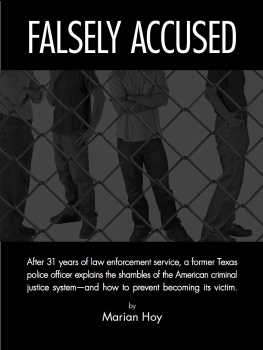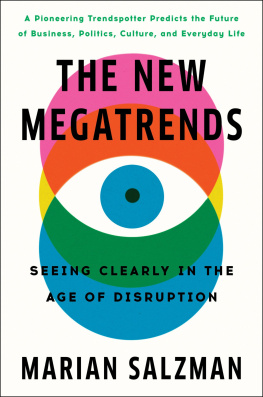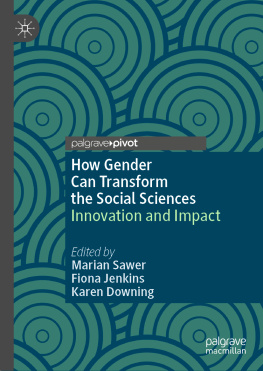Marian Barnes 2006
All rights reserved. No reproduction, copy or transmission of this publication may be made without written permission.
No paragraph of this publication may be reproduced, copied or transmitted save with written permission or in accordance with the provisions of the Copyright, Designs and Patents Act 1988, or under the terms of any licence permitting limited copying issued by the Copyright Licensing Agency, 90 Tottenham Court Road, London W1T 4LP.
Any person who does any unauthorised act in relation to this publication may be liable to criminal prosecution and civil claims for damages.
The author has asserted her right to be identified as the author of this work in accordance with the Copyright, Designs and Patents Act 1988.
First published 2006 by
PALGRAVE MACMILLAN
Houndmills, Basingstoke, Hampshire RG21 6XS and
175 Fifth Avenue, New York, N.Y. 10010
Companies and representatives throughout the world
PALGRAVE MACMILLAN is the global academic imprint of the Palgrave Macmillan division of St. Martins Press, LLC and of Palgrave Macmillan Ltd. Macmillan is a registered trademark in the United States, United Kingdom and other countries. Palgrave is a registered trademark in the European Union and other countries.
ISBN-13: 9781403921611 hardback
ISBN-10: 140392161X hardback
ISBN-13: 9781403921628 paperback
ISBN-10: 1403921628 paperback
This book is printed on paper suitable for recycling and made from fully managed and sustained forest sources.
A catalogue record for this book is available from the British Library.
A catalog record for this book is available from the Library of Congress.
10 9 8 7 6 5 4 3 2 1
15 14 13 12 11 10 09 08 07 06
Printed in China
Preface
My aim in this book is to offer an alternative way of viewing care-giving to that evident in much of the substantial literature that exists on this subject. This is intended to encourage a social care practice capable of supporting caring relationships so that the value and integrity of individual care givers and receivers is respected. This should take place within the context of social policies which recognise the contribution that care-giving can make to social cohesion and social justice.
The overwhelming emphasis of much of the existing body of work on caring is to present care-giving as a problem: for those giving and receiving care, as an expression of gendered social relations, as contributing to the oppression of disabled and older people, and for policy makers and practitioners seeking to minimise demands on the welfare state. One effect of this, I argue, is that front-line practitioners adopt a very narrow perspective in assessing and responding to the needs of those involved in caring relationships. They focus on the immediate situation rather than viewing this in the context of shared biographies, and their responses seek to balance assessment of risk with levels of dependency rather than offering help to support the achievement of aspirations. As a result, carers often experience such interventions as unhelpful or as missing the point. When presenting my ideas for this project to a carers organisation I received considerable support for the approach advocated here and a great willingness to support a project that aimed to contribute to the development of more holistic and effective practice.
At a social level a care perspective alerts us to the inadequacy of notions of social justice located solely in appeals to individual rights. In line with Tronto (1993), in an analysis developed by Sevenhuijsen (1998), I argue that a broad conception of social justice requires the inclusion of the principles of attentiveness, reciprocity, responsibility, competence and responsiveness which have been defined as constituting an ethic of care. At a collective level: Solidarity without care leads to an impoverished sense of morality and collective responsibility, because it can only recognize others if they are like us or needy, pathetic, pitiful and worthy of our commiseration because of their comparative deprivation in relation to ourselves (Sevenhuijsen, 1998, p. 147).
Starting with individual carers stories and thus prioritising the value of an understanding based in the subjective experience of carers, the book develops this analysis in order to suggest ways in which social care practitioners might more effectively seek to support caring relationships in ways that neither sanctify carers nor assume they are resources to be used or commanded (Twigg and Atkin, 1994). I argue that such a practice is less likely to approach recipients of care as the source of burden, or as individuals whose rights should be championed in opposition to those of carers. Whilst the book starts with individual stories, it also considers the significance of the carers movement as one example of a range of social movements in social care which challenge dominant assumptions of expertise associated with professional training and qualification, and draw our attention to the importance of values in social relations. User and carer movements pose questions about the way in which we live together and how we regard our fellow citizens. But this discussion also addresses the tensions that have been created as a result of naming carers as a distinct social group, at the same time as reflecting on the importance of the movement in drawing attention to the significance of care and caring relationships as a necessary aspect of social well-being.
The book draws on a range of sources, but the primary original source is narrative interviews carried out with 12 carers. All the carers involved were family members who constitute the majority of care-givers. All but two had identified themselves as carers through becoming involved in a carers organisation. One exception was a man who was known to me as someone who had worked in paid caring posts as well as having looked after his mother, and another man looking after his wife was identified by another of my interviewees. The carers I interviewed offered to speak to me after I had explained the purpose of this project to them and what it would involve for them. Initially two other men had offered to talk to me but each subsequently withdrew (in different ways). Thus ten of the twelve carers interviewed were women. One was Asian, one Jamaican, one born in Ireland, one in Germany and another from a Polish background. They were involved in a range of current and former caring relationships, although none was a child supporting an adult. Whilst it was important for the purpose of this book to include a range of experiences amongst the stories I generated, my intention was not to design research that aimed to access a representative group of carers.
I argue the importance of narrative as a method in working with carers and those they help, to make sense of their lives together and separately, and to imagine possible futures, and in the context of assessment a process I conceptualise as seeking sufficient understanding of others lives in order to work with them to determine appropriate, helpful (Shakespeare, 2000) interventions, and as a means of generating theories which can offer useful insights into the social role of care.
The book also draws from literature on care-giving from different nations and cultures not only to locate individual caring biographies within what Chamberlayne and King (2000) have called Cultures of Care, but also to reflect on different ways of viewing care from that which is most evident in the literature of white, Western cultures. For example, I will reflect on hooks (1984) critique of white feminist analyses of motherhood and caring which points to a way of constructing care as part of a process through which people can challenge oppressions through solidarity in kinship groups. I will also consider the role of lay care in sustaining community in adversity reflecting, for example, on the impact of HIV/AIDS on communities in southern Africa.












